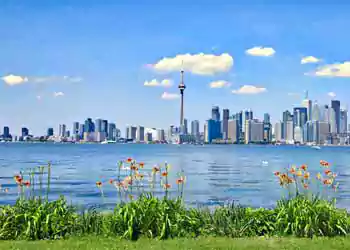
Health insurance for Canadians in USA
Travel health insurance from Canada to USA
Canada is a federation, with a parliamentary system of government. Being a federation means that powers and responsibilities are divided between the federal government and the 10 provincial governments. The ten provinces are Alberta, British Columbia, Manitoba, New Brunswick, Newfoundland and Labrador, Nova Scotia, Ontario, Prince Edward Island, Quebec, and Saskatchewan and three territories are Northwest Territories, Yukon, and Nunavut. These governments are authorized to legislate only within their regional geography, but enjoy a wide range of powers and responsibilities.
Canada has three levels of government: federal, provincial and municipal (cities and towns). These governments are elected by the citizens of Canada.
Federal government is authorized to enact legislation across the entire nation, and enjoys its own powers and areas of responsibility. In many cases, these federal responsibilities are related to areas deemed to be of national interest as opposed to simply regional or local interests. The federal government is granted its own powers and responsibilities, which cannot be altered unilaterally by another level of government.
The federal government is responsible for:Provincial government: Provincial governments in Canada are commonly referred to as a ?level of government.? The provinces, as a regional level of government, have their own specific powers and jurisdictions, and are authorized to pass legislation within their particular regional boundaries. Canada has 10 provincial governments: British Columbia, Alberta, Saskatchewan, Manitoba, Ontario, Quebec, Newfoundland and Labrador, Nova Scotia, New Brunswick and Prince Edward Island. The provincial governments granted constitutional powers that cannot be altered unilaterally by other levels of government, such as the federal government.
Provincial governments are responsible for:Territorial government: The Northwest Territories, Yukon and Nunavut are not sovereign units. They get their powers from the federal parliament, but they have elected assemblies that follow many of the same practices as the provincial governments.
Municipal government is a local government created by the provinces to provide services that can be more effectively handled under local control. The powers and responsibilities which municipal governments may exercise are usually set out in a general municipal statute, often known as the Municipal Act, the Local Government Act, the Cities and Towns Act or some similar name. Municipal governments make policy, raise revenue and ensure the implementation of policy.
Municipal governments includes:
Travel health insurance from Canada to USA

Buy Indian Insurance Online
INDIA INSURANCE
Indian medical insurance online
Travel Insurance policies!!

Is your family visiting you?
GET THEN INSURED
Find Affordable
TRAVEL INSURANCE!!

Packages for your holiday?
TOUR PACKAGES IN INDIA
Best Travel deals
Enquire Now!

We will help find the best holiday package for you!!!
Enquire Now